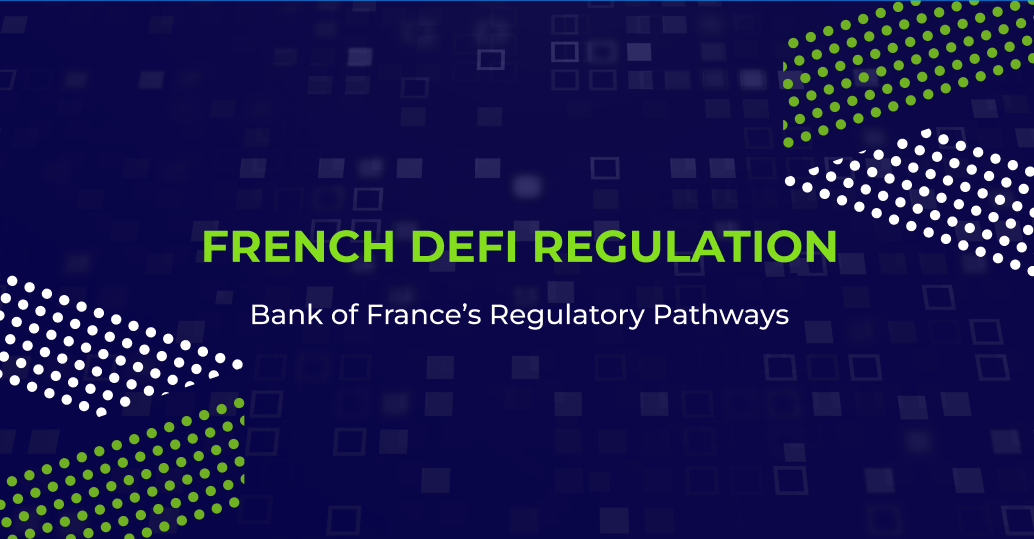DeFi Regulation: France Proposes New Regulatory Framework
Written by
Krista Alvarez
Published on
April 12, 2023
Time reading
5 minutes

The recent banking crisis has sparked renewed interest in Bitcoin and the digital asset ecosystem, particularly decentralized finance (DeFi). Advocates of DeFi see it as the future of finance, but the Bank of France (APCR) has published a discussion paper outlining the potential risks and regulatory recommendations for this emerging industry.
Understanding the DeFi Regulation and Ecosystem
The APCR characterizes DeFi as comprising three main layers: the blockchain infrastructure, the services application layer, and mechanisms allowing users to access these services. The paper argues that the term “decentralized finance” is misleading, as the governance of DeFi applications can be highly centralized. Instead, the authors suggest referring to it as “disintermediated finance.”
Addressing these concerns, the APCR presents several DeFi regulation options that take into account the unique features of DeFi. The paper emphasizes that DeFi regulation should not be conceived as a monolithic block but rather as a combination of traditional financial regulations and those inspired by other economic sectors. By embracing such a DeFi regulation approach, regulators can effectively mitigate risks while promoting innovation and maintaining the dynamic nature of the DeFi ecosystem.
Risks and Vulnerabilities in DeFi
The APCR identifies weaknesses and vulnerabilities in each layer of the DeFi ecosystem, emphasizing that the same features that make disintermediated finance advantageous also contribute to its vulnerability. The paper warns that users’ access to DeFi services exposes them to high risks of capital loss, potentially threatening the ecosystem’s internal stability.
Regulatory Proposals for DeFi Regulation
The APCR presents several regulatory options for mitigating DeFi’s risks, emphasizing the need for regulations tailored to the unique features of DeFi. The proposals include:
1. Strengthening Blockchain Infrastructure Security
This proposal calls for blockchain networks to be certified according to minimum security standards. Requirements include computer code certification, a minimum number of validators, and a cap on validation capacity concentration.
2. Transitioning Financial Functions to Private Blockchains
The APCR suggests transferring all financial functions to private blockchains to guarantee appropriate governance and security levels. However, the paper notes that this approach could limit the innovation capabilities of disintermediated finance.
3. Establishing a Certification Process for Smart Contracts
The authors recommend a certification process for smart contracts that covers computer code security, the nature of the provided service, and governance. Certifications would be granted after completing an audit by a human expert.
4. Creating an Improved Framework for Service Provision and User Access
This proposal involves developing a framework that requires service providers offering sensitive services to incorporate, subjecting them to supervision. The paper also recommends assigning a legal statute to decentralized autonomous organizations (DAOs), allowing for their supervision.
5. Utilizing Intermediaries for DeFi Regulation
As only a few users have the skills needed to interact directly with DeFi applications, the APCR suggests using intermediaries to regulate the majority of DeFi users. Access to DeFi would be contingent on the user’s financial literacy and risk appetite, assessed objectively.

The European Context and Future Regulation
The proposals in the APCR’s paper aim to contribute to ongoing discussions at the European level, particularly in light of the MiCA Regulation. These discussions are vital in shaping DeFi regulation and ensuring a stable and secure ecosystem. Meanwhile, the French Economy Ministry is exploring the regulation of the metaverse to prevent large multinational internet companies from dominating this virtual space and to promote digital sovereignty for Europe.
As DeFi continues to evolve, it is crucial for regulators to carefully assess the risks and develop tailored DeFi regulations to ensure a safer and more stable ecosystem. The APCR’s proposals offer a starting point for discussions and potential regulatory measures that can benefit the entire DeFi regulation landscape. By fostering collaboration and innovation, the industry can establish effective DeFi regulation practices to support its growth and long-term sustainability.
French Public Consultation on Metaverse Regulation
The French government has also initiated a public consultation on regulating the metaverse. They aim to gather feedback on policy issues such as privacy, health, and environmental risks associated with virtual worlds. This initiative seeks to establish a European “digital sovereignty” and prevent large multinational internet companies from dominating the metaverse.
The consultation targets a wide range of stakeholders, including citizens, companies, associations, and researchers, allowing them to express their expectations and help design a French strategy capable of anticipating the metaverse transition.
The metaverse, a virtual immersive universe, can take various forms and methods of use, relying on multiple technological bases. These technologies include virtual reality, augmented reality, mixed reality, blockchain, digital twins, 3D creation software, and game engines. The public consultation aims to address the challenges and opportunities presented by these technologies in shaping the future of the metaverse.
Balancing Innovation and Regulation in DeFi and the Metaverse
As both DeFi and the metaverse gain traction, finding the right balance between fostering innovation and implementing effective regulations becomes crucial. The APCR’s proposals for DeFi regulation and the French government’s public consultation on the metaverse demonstrate the importance of collaborative and forward-thinking approaches.
Involving various stakeholders in the regulatory process ensures diverse perspectives are taken into account. By engaging citizens, companies, associations, and researchers, regulators can develop more comprehensive and effective policies that address the unique challenges of emerging technologies like DeFi and the metaverse.
The dynamic nature of DeFi and the metaverse requires constant adaptation and flexibility from regulators. As new developments and challenges arise, regulatory frameworks should be regularly reassessed and updated to maintain their relevance and effectiveness.
Navigating the Future of DeFi and the Metaverse
The APCR’s discussion paper on DeFi regulation and the French government’s public consultation on the metaverse reflect a growing awareness of the need to address the risks and challenges posed by these emerging technologies. By developing tailored regulations, engaging stakeholders, and fostering a collaborative approach, regulators can help create a safer and more stable environment for both DeFi and the metaverse while preserving their innovation potential.